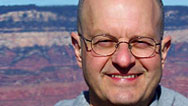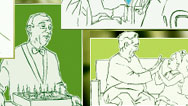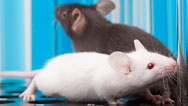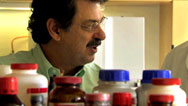Aging
- Posted 01.09.07
- NOVA scienceNOW
(This video is no longer available for streaming.) Scientists are rapidly gaining insight into the processes that cause aging and the possibility of reengineering them to extend life. While studying the science of aging from various angles, David Sinclair of Harvard Medical School has found that resveratrol, the molecule long suspected to make red wine healthful, appears to help organisms from yeast to flies live 30 to 60 percent longer. He also has found evidence that resveratrol may ward off the diseases of aging in mice. NOVA scienceNOW follows Sinclair and other scientists honing in on the keys to longevity. Could a simple pill someday be developed to extend the human life span?
Transcript
AGING
PBS Airdate: January 9, 2007
NEIL DEGRASSE TYSON: Hello, I'm Neil DeGrasse Tyson, your host for NOVA scienceNOW.
First up: at one time or another, each of us wonders, "How long will I live? Seventy, 80, 90 years?"
The average American lifespan is now about 78 years, but a few people live much longer, 100 years or more. They don't seem to age like the rest of us.
Correspondent Chad Cohen met up with a few of them and the scientists who are trying to sort out why.
MAN # 2: We don't feel old. We feel young.
WOMAN # 5: We don't feel old.
CHAD COHEN (Correspondent): There aren't many of them out there.
WOMAN # 1: I'm 96.
MAN # 1 : ...ninety-seven.
WOMAN # 2: ...ninety-eight.
CHAD COHEN: How old are you?
MAN # 2: A hundred, one.
CHAD COHEN: Only one in 10,000 of us, in fact, will defy all the odds and live the long, healthy lives that these folks have. What's the secret?
WOMAN # 3: I really don't have any clue.
WOMAN # 4: I don't have a secret.
MAN # 2: You'll have to ask upstairs.
CHAD COHEN: Well, down here, biologists are having a go, studying every aspect of these long-lived people to see if their elixir of life might be available to the rest of us.
MAN # 2: Let's hope!
CHAD COHEN: Nir Barzilai, of the Albert Einstein College of Medicine, in Bronx, New York, has worked with this genetically distinct population of Ashkenazi Jews for the last eight years, wondering, "What do they have that the rest of us don't?"
NIR BARZILAI: They are born in the early 1900s; many children are dying in epidemics of childhood diseases. So they survive already that. And then they get to middle age and there are all the middle ages diseases. There is the cancer, and the cardiovascular, and they don't get touched by that. And then they have to survive getting to 100. It's an incredible journey against odds.
WOMAN # 3: It wasn't really milk and honey, my life, but here I am.
CHAD COHEN: But none of them have exactly been following doctor's orders.
NIR BARZILAI: I would say the opposite.
WOMAN # 3: ...every day, French fries.
WOMAN # 1: ...roast beef.
MAN # 1: You can drink, but no mixed drinks, just Scotch.
NIR BARZILAI: There is no yogurt eater, there is no vegetarian.
CHAD COHEN: Forty-six years of cigarette smoking?
MAN # 2: Yah.
CHAD COHEN: And you still 101 years old?
MAN # 2: I'm still one-hundred-one-and-a-half years old.
NIR BARZILAI: All the things that we tell our patients to do, they didn't do, and it didn't bother them, they got there anyhow.
CHAD COHEN: Do you feel lucky that you've lived as long as you have?
WOMAN # 3: Of course.
CHAD COHEN: They did have help though, as Barzilai discovered.
NIR BARZILAI: There is an unusual history of longevity in their family.
WOMAN # 2: The youngest sister of my father was 98, and my mother was 92.
MAN # 1: I still have an aunt, my mother's side of the family who's alive; she's a hundred and one.
WOMAN # 4: This is a picture of my husband and this huge kiss. After that we got married.
CHAD COHEN: Something very special was protecting them from the environment and their own excesses.
WOMAN # 4: We have good genes. We owe it all to our mother and father.
CHAD COHEN: And when the team peered into their blood, it became clear what it was.
NIR BARZILAI: The initial thing that was striking is that many, many people in the study had very high HDL cholesterol. HDL cholesterol is the good cholesterol.
CHAD COHEN: Good because it cleans up the bad cholesterol by schlepping the bad cholesterol away, so, the more the merrier.
But something else was going on with the HDL cholesterol. We saw that they were amazingly large at our...with our centenarians.
It seems the bigger the HDL, the better. Perhaps because bigger HDL hauls away more bad stuff than smaller HDL does. Sixty percent of the centenarians had these larger HDLs.
NIR BARZILAI: So this became a major marker of exceptional longevity and also directed us to several of the genes that we tested.
CHAD COHEN: Barzilai smeared our centenarians' DNA onto chips loaded with cholesterol genes.
NIR BARZILAI: This chip contains 500,000 variations that humans can have on their DNA.
CHAD COHEN: Barzilai found that three particular mutations in three different genes distinguished many of their DNA from the general population. And all those changes play a role in making HDL bigger and protecting against age-related disorders like diabetes and cardiovascular disease.
NIR BARZILAI: So then we feel more comfortable in saying, "You know what? This is a longevity gene."
CHAD COHEN: The idea of a small number of longevity genes flies in the face of scientific wisdom, which has long held that aging involves hundreds, even thousands of genes all running amok. But that's never sat well with MIT's Leonard Guarente, thanks to one bizarre, but confirmed, finding.
Cut just about any organism's food supply by 30 to 40 percent, and it will live up to 50 to 60 percent longer.
LEONARD GUARENTE (Massachusetts Institute of Technology): If aging is complicated, multi-factorial, so on and so forth, how could a simple dietary change make an organism live longer?
CHAD COHEN: To find out, Guarente started simply, with a simple organism: baker's yeast, the stuff of beer and bread. In their brief lifespan —about two weeks—yeast cells typically divide a total of 20 times. Every once in a while though, a yeast lives longer than that, dividing, say, 25 or 30 times. Those are what Guarente looked for, the yeast equivalent of our centenarians.
Well, it took them about eight years, but Guarente's group finally found that these long-lived yeast also have life-extending mutations in their DNA in a specific family of genes, called "sirtuins." Yep, genes have names too.
Delete the most powerful of these genes, called "SIR2," from a yeast cell and it will die earlier. Add extra copies back in and it will live up to 50 percent longer.
LEONARD GUARENTE: Okay, we know this is important for countering aging, but what does the gene do?
CHAD COHEN: Ah, well sirtuins, as the scientists soon discovered, are part of an intricate stress response. When times are tough, they kick an organism into survival mode to beef up DNA repair or stop cells from dying. And it turns out, nothing sets these sirtuins into action like a shortage of food.
LEONARD GUARENTE: And that's why our finding with SIR2, I thought, was an epiphany, because it gave a possible explanation for how a reduction in calories in the diet could be equated with a long life.
CHAD COHEN: People have sirtuin genes too, although we don't know how important they are yet. But the more these scientists experiment in yeast, and then in worms and flies, the more they realize how vital this calorie-sirtuin connection is.
David Sinclair, once a post-doc in Guarente's lab, now runs his own at Harvard Medical School.
DAVID SINCLAIR: What my lab and others have found is that when you get rid of the SIR2 gene, the diet doesn't work anymore.
CHAD COHEN: So put them on a calorie-restricted diet, they live longer. Take away this gene, put them on the same diet, they don't live longer?
DAVID SINCLAIR: Exactly.
CHAD COHEN: Amazing as that sounds, sirtuins aren't the only genes that do this.
For more than a decade, Cynthia Kenyon of the University of California, San Francisco, has been making these microscopic worms, called "C. elegans" live far longer than believed wormly possible.
CYNTHIA KENYON (University of California, San Francisco): You just change one gene and the whole animal is fine, it's incredible.
CHAD COHEN: By damaging a single gene, this one's called daf-2, these worms live twice as long. Daf-2 helps makes insulin work. When it's mutated, you get less insulin, and that brings us back to calorie restriction because it has the same effect.
CYNTHIA KENYON: You limit food intake, that leads to a decrease in the level of insulin, so that should lead to life span extension.
CHAD COHEN: It turns out, low insulin levels kick on survival genes too, just like the sirtuins. So by damaging daf-2, the wormly life is longer.
CYNTHIA KENYON: You can see why they call it elegans—they're very beautiful.
CHAD COHEN: These squiggly squirmy guys are about four days old. But in two weeks...
CYNTHIA KENYON: They look terrible. They're in the nursing home. They look like they're falling apart. Their heads are moving, barely, but that's it. And now, prepare yourself for something amazing. This is the mutant worm. We changed just one gene, the daf-2 gene, at that same age, and you can see it's moving around. It looks great. It's equivalent to looking at someone that's 90 and thinking that they're 45.
CHAD COHEN: And the best part, when the equivalent genes were tweaked in flies and then in mice, their healthful properties were also preserved.
CYNTHIA KENYON: These long-lived animals are resistant to a whole range of age-related diseases. The worms have muscle deterioration that happens later. The fruit flies are more resistant to heart failure. The mice are more resistant to cancer. This is a whole new way of thinking about disease, a whole new way.
CHAD COHEN: But hold on a minute. If all of this research is so tied to cutting calories how do we explain these guys?
WOMAN # 1: I always had breakfast; I always had lunch.
MAN # 2: I eat whatever I like, and I do what I like.
DAVID SINCLAIR: It could be that they have different variants of these longevity genes, allowing them to experience the effects of calorie restriction without really having to do the diet.
CHAD COHEN: So what about the rest of us then, who may not be so blessed? Can we live longer by eating less? Well, it's not proven in people yet but the answer, to many scientists, is "probably"—if we eat a lot less, 30 to 40 percent less to be exact, which means the food someone like me might take in a day would shrink from about 2,500 calories to 1,500 calories. Hey, it's no fun, but people do it.
DAVID SINCLAIR: I did try calorie restriction for about a week and gave up. It's not a pleasant way to exist.
CHAD COHEN: Perhaps it was pangs of hunger that lead David Sinclair towards his next venture: finding drugs that offer the benefit of calorie restriction without the drastic diet.
He's off to a good start. Sinclair found that resveratrol, the molecule that has been touted to make red wine healthful, stimulates the sirtuin genes and allows everything from yeast to worms to flies to live 30 to 40 percent longer. And it's looking good for mice.
Barzilai, Guarente and Kenyon are also seeing their gene targets make their way into the pharmaceutical arena.
DAVID SINCLAIR: I'm hoping that, within my lifetime, we'll see the benefits of this research. Being very optimistic, we could see these in the next five to 10 years.
WOMAN # 4: That would be wonderful.
CHAD COHEN: In the meantime, none of the scientists are exactly waiting around for this to happen.
CYNTHIA KENYON: I eat a diet that is predicted to keep my insulin levels lower.
LEONARD GUARENTE: I don't calorie restrict, but I don't gorge myself.
DAVID SINCLAIR: I drink more red wine than I used to.
NIR BARZILAI: My HDL is good, because I'm taking two different drugs to increase that.
CHAD COHEN: Would you recommend living this long to everyone?
MAN # 2: Why not?
MAN # 1: Yes.
WOMAN # 1: Of course.
WOMAN # 2: Yeah. Life is wonderful.
MAN # 2: When I am 110, I want to see you here again.
CHAD COHEN: It's a date.
MAN # 2: You shake hands with me?
CHAD COHEN: I'll shake hands with you. It's a date.
Credits
Aging
- Edited by
- Stephen Mack
- Produced and Directed by
- Chad Cohen
NOVA scienceNOW
- Executive Producer
- Samuel Fine
- Executive Editor
- Neil deGrasse Tyson
- Senior Series Producer
- Vincent Liota
- Supervising Producer
- Stephen Sweigart
- Editorial Producer
- Julia Cort
- Development Producer
- Vinita Mehta
- Program Editor
- David Chmura
- Post Production Supervisor
- Win Rosenfeld
- Unit Manager
- Candace White
- Associate Producers
- Mica McCarthy
- John Pavlus
- Win Rosenfeld
- Anna Lee Strachan
- Production Secretary
- Fran Laks
- Animator
- Brian Edgerton
- Compositor
- Yunsik Noh
- Camera
- Edward Marritz
- Robert Hanna
- Anthony Forma
- Peter Bonilla
- Stephen McCarthy
- Sound Recordists
- Alex Sullivan
- Michael Karas
- Mark Mandler
- Steve Jones
- Rusty Duggan
- Audio Mix
- John Jenkins
- Colorist
- Jim Ferguson
- Animation
- Sputnik
- Vincent Liota
- Space elevator animation by Space Elevator Visualization Group
- Visual Effects Supervisors
- Alan Chan
- Lee Stringer
- Digital Artists
- Eki Halkka
- Michael Cliett
- Matt Zeyn
- Jeff Leroy
- Jackson Yuen
- Consultant
- Brad Edwards
- Additional Editing
- Patricia Stern
- Win Rosenfeld
- Music
- Rob Morsberger
- NOVA scienceNOW Series Animation
- Edgeworx
- Archival Material
- Philip Baird/AnthroArcheArt.org
- Robert Frerck/Odyssey Productions/Chicago
- Getty Images
- HarperCollins Publishers, Inc. (Arthur Clarke recording)
- NASA
- Longevity Study Participants
- Barbara Brody
- Irma Daniel
- Sylvia Goldberger
- Frances Horowitz
- Toby Kirsh
- Louis Levinson
- Arthur Stern
- Special Thanks
- Harry's Coffee Shop
- Mike Jorgenson/WPRB
- Jason Saunders
- Arthur C. Clarke
- Rohan de Silva/The Arthur C. Clarke Foundation
- Oak Ridge National Laboratory
- Ray Baughman
- University of Wollongong
- The Space Needle Corporation
- Wirefly X PRIZE Cup
- LiftPort, Inc.
- Neil deGrasse Tyson
- is director of the Hayden Planetarium in the Rose Center for Earth and Space at the American Museum of Natural History.
- NOVA Series Graphics
- yU + co.
- NOVA Theme Music
- Walter Werzowa
- John Luker
- Musikvergnuegen, Inc.
- Additional NOVA Theme Music
- Ray Loring
- Post Production Online Editor
- Spencer Gentry
- Closed Captioning
- The Caption Center
- NOVA Administrator
- Ashley King
- Publicity
- Eileen Campion
- Anna Lowi
- Yumi Huh
- Lindsay de la Rigaudiere
- Researcher
- Gaia Remerowski
- Production Coordinator
- Linda Callahan
- Unit Manager
- Carla Raimer
- Paralegal
- Raphael Nemes
- Legal Counsel
- Susan Rosen Shishko
- Assistant Editor
- Alex Kreuter
- Associate Producer Post Production
- Patrick Carey
- Post Production Supervisor
- Regina O'Toole
- Post Production Editor
- Rebecca Nieto
- Post Production Manager
- Nathan Gunner
- Producers, Special Projects
- Susanne Simpson
- Lisa Mirowitz
- Coordinating Producer
- Laurie Cahalane
- Senior Science Editor
- Evan Hadingham
- Senior Series Producer
- Melanie Wallace
- Managing Director
- Alan Ritsko
- Senior Executive Producer
- Paula S. Apsell
This material is based upon work supported by the National Science Foundation under Grant No. 0229297. Any opinions, findings, and conclusions or recommendations expressed in this material are those of the author(s) and do not necessarily reflect the views of the National Science Foundation.
NOVA scienceNOW is a trademark of the WGBH Educational Foundation
NOVA scienceNOW is produced for WGBH/Boston by NOVA
© 2007 WGBH Educational Foundation
All rights reserved
- Image credit: (hands) © CORBIS
Participants
- Nir Barzilai
- Yeshiva University
- Chad Cohen
- Correspondent
- Leonard Guarente
- MIT
- Cynthia Kenyon
- University of California, San Francisco
- David Sinclair
- Harvard University www.hms.harvard.edu/dms/bbs/fac/sinclair.html
Related Links
-

Aging: Expert Q&A
Molecular biologist Leonard Guarente answers questions about aging and how science could help increase longevity.
-

Healthy Old Age
Learn how a gene called SIR2 can affect aging and longevity, at least in yeast.
-

A Human Habitat
The "Eden Alternative" movement suggests that eight things are critical for the elderly to maintain mental health.
-

Of Mice and Memory
Mice placed in enriched environments can recover lost memories, giving hope to those who study Alzheimer's.
-

Marathon Mouse
With an "exercise pill," researchers turn couch-potato rodents into champion runners.
-

Aiding Aging Muscles
See how "exercise in a pill" could one day help the elderly and the bedridden.



